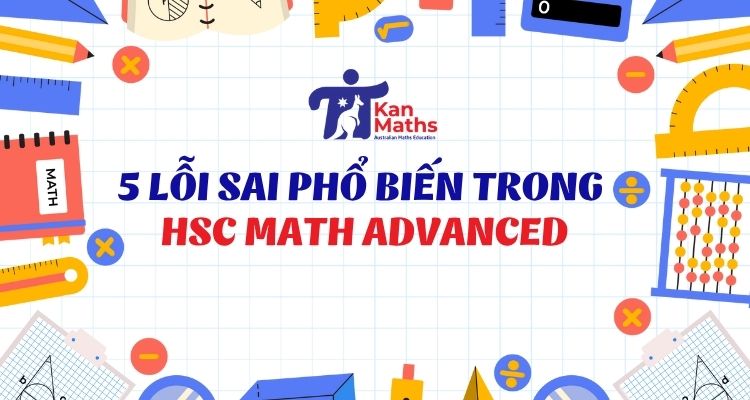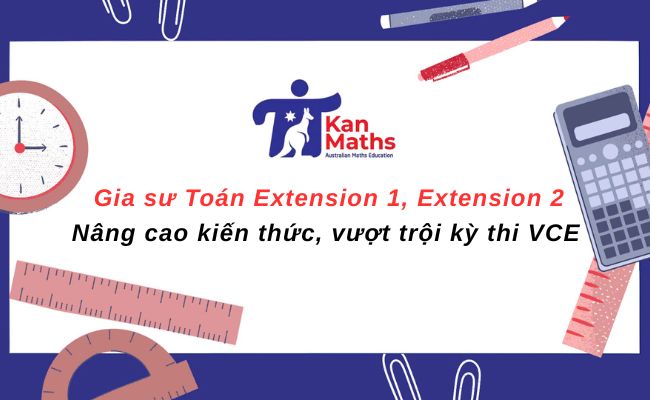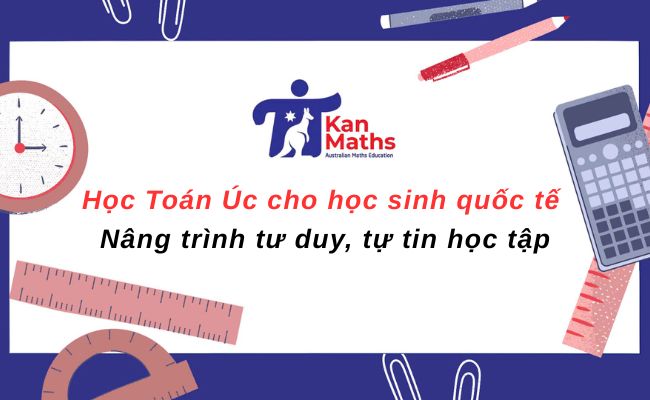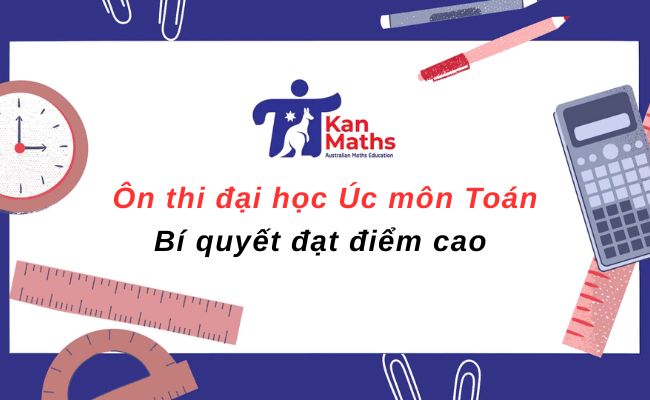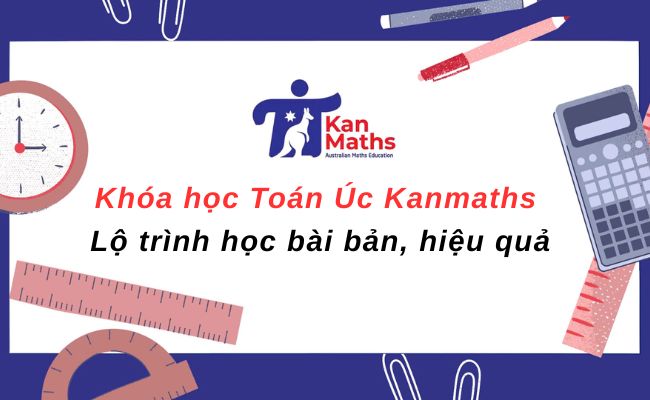HSC Math Advanced là một trong những môn khó nhất trong chương trình HSC, và nhiều học sinh thường mắc phải những lỗi sai cơ bản có thể được tránh hoàn toàn. Việc nhận biết và khắc phục những lỗi này sẽ giúp bạn cải thiện đáng kể điểm số và đạt được kết quả mong muốn.

Tại Sao Cần Tránh Những Lỗi Sai Phổ Biến?
Trong HSC Math Advanced, mỗi điểm số đều quý giá và có thể quyết định ATAR final của bạn. Những common mistakes không chỉ làm mất điểm trong câu hỏi đó mà còn có thể ảnh hưởng đến confidence và time management trong suốt bài thi. Understanding và avoiding những pitfalls này là crucial step để achieve excellence.
Impact của Common Mistakes:
Immediate consequences:
-
Mark deduction: Mất điểm trực tiếp từ calculation errors
-
Time wastage: Phải redo calculations và lose precious exam time
-
Confidence loss: Doubt about abilities ảnh hưởng performance
-
Stress increase: Anxiety levels rise khi discover mistakes
Long-term effects:
-
ATAR impact: Cumulative effect có thể lower final score significantly
-
University admission: Missed cutoff scores cho preferred courses
-
Future opportunities: Limited options cho STEM pathways
-
Self-doubt: Decreased confidence trong mathematical abilities
Lỗi #1: Không Đọc Kỹ Đề Bài
Đây là lỗi phổ biến nhất và cũng dễ tránh nhất trong HSC Math Advanced. Nhiều học sinh thường vội vàng bắt đầu giải mà không spend enough time để understand exactly what the question is asking.
Manifestations của lỗi này:
Misreading question requirements:
-
Answer wrong part: Tính derivative thay vì integral
-
Units confusion: Forget to convert units properly
-
Rounding errors: Not following specified decimal places
-
Domain restrictions: Ignore given constraints hoặc conditions
-
Graph interpretation: Misread axis labels hoặc scales
Incomplete solutions:
-
Partial answers: Stop at intermediate steps
-
Missing justification: Don't explain reasoning when required
-
Format errors: Not presenting answer trong required form
-
Verification neglect: Don't check if answer makes sense
-
Context ignorance: Ignore real-world meaning của result
Real examples từ past papers:
Example 1 - Calculus Question:
-
Question asks: "Find the rate of change of volume when radius = 3cm"
-
Common mistake: Students find dV/dr but forget to substitute r = 3
-
Correct approach: Calculate derivative THEN substitute specific value
Example 2 - Probability:
-
Question asks: "Probability of at least 2 successes"
-
Common mistake: Calculate P(X = 2) instead của P(X ≥ 2)
-
Correct approach: Use complement rule P(X ≥ 2) = 1 - P(X ≤ 1)
Prevention strategies:
Systematic reading approach:
-
Read twice: Once for overview, once for details
-
Highlight keywords: Mark important terms và requirements
-
Identify unknowns: What exactly are you solving for?
-
Note constraints: Any domain restrictions hoặc special conditions
-
Check units: Ensure consistency throughout solution
Question analysis technique:
-
What is given?: List all provided information
-
What is required?: Clearly state the final answer needed
-
What method?: Identify appropriate solution technique
-
What checks?: Plan verification steps
-
What format?: How should answer be presented?
Lỗi #2: Làm Tắt Các Bước Trung Gian
Pressure của exam time thường khiến students skip intermediate steps, leading to calculation errors và loss of valuable method marks trong HSC Math Advanced marking scheme.
Tại sao students làm tắt steps:
Time pressure psychology:
-
Panic mode: Rush to finish within time limit
-
Overconfidence: Think steps are "obvious" và skip them
-
Poor planning: Don't allocate time properly across questions
-
Perfectionism: Want to attempt every question rather than do fewer well
-
Comparison anxiety: See others working fast và feel pressure
Misunderstanding marking:
-
Method mark ignorance: Don't realize partial credit available
-
All-or-nothing thinking: Believe only final answer matters
-
Working assumption: Think examiners can "fill in" missing steps
-
Neat presentation misconception: Believe less writing = better presentation
-
Formula reliance: Over-rely on formula sheet without showing application
Specific areas where skipping hurts:
Calculus problems:
-
Chain rule applications: Not showing each derivative step
-
Integration by substitution: Skipping u-substitution details
-
Related rates: Not clearly defining variables và relationships
-
Optimization: Missing constraint handling steps
-
Area calculations: Not setting up integral bounds properly
Algebra manipulations:
-
Equation solving: Not showing each algebraic step
-
Factoring: Jumping to final form without intermediate steps
-
Logarithm rules: Not explicitly stating which property used
-
Trigonometric identities: Not showing identity applications
-
Complex number operations: Skipping rectangular/polar conversions
Method mark maximization strategies:
Show every significant step:
-
Write formulas first: State relevant formulas before applying
-
Substitute clearly: Show values being substituted
-
Simplify gradually: Don't jump to final simplified form
-
Label intermediate results: Make calculations easy to follow
-
Explain reasoning: Brief explanation của approach chosen
Calculation presentation:
-
Line-by-line working: Each step on new line
-
Clear equals signs: Proper mathematical notation
-
Bracket usage: Show order of operations clearly
-
Fraction simplification: Step-by-step reduction
-
Decimal approximation: Show exact form first, then approximate
Lỗi #3: Sai Lầm Trong Việc Sử Dụng Calculator
Modern calculators are powerful tools trong HSC Math Advanced, but improper use often leads to errors that could easily be avoided with better technique và understanding.
Common calculator errors:
Input mistakes:
-
Bracket errors: Not grouping operations properly
-
Mode confusion: Degree vs radian settings wrong
-
Memory issues: Previous calculations affecting current ones
-
Function mix-ups: Using wrong function for operation
-
Syntax errors: Incorrect calculator language
Over-reliance problems:
-
No verification: Blindly trust calculator results
-
Rounding too early: Intermediate rounding causing errors
-
Complex number handling: Calculator limitations not understood
-
Graph misinterpretation: Viewing window issues
-
Statistical function confusion: Wrong distribution parameters
Specific HSC contexts where errors occur:
Trigonometry:
-
Angle mode mistakes: Using degrees when radians required
-
Inverse function confusion: arcsin vs sin^(-1) interpretation
-
Period calculations: Not adjusting for correct units
-
Graph analysis: Wrong viewing window causing missed features
-
Identity verification: Calculator approximation vs exact values
Statistics và Probability:
-
Distribution parameters: Wrong mean/standard deviation input
-
Cumulative vs probability: P(X ≤ x) vs P(X = x) confusion
-
Normal distribution: Z-score calculation errors
-
Regression analysis: Misinterpreting correlation coefficient
-
Hypothesis testing: Wrong tail probabilities
Calculator mastery techniques:
Pre-exam preparation:
-
Function familiarization: Know all relevant functions thoroughly
-
Practice sessions: Regular use with textbook problems
-
Error checking: Develop habits for verification
-
Manual backup: Can solve key problems without calculator
-
Mode management: Consistent settings for different problem types
Exam strategy:
-
Clear memory: Start fresh for each major calculation
-
Reasonable results: Always check if answer makes sense
-
Exact vs approximate: Know when each is appropriate
-
Multiple methods: Use different approaches to verify
-
Time allocation: Don't spend excessive time on calculator work
Lỗi #4: Quản Lý Thời Gian Kém
Time management là critical skill trong HSC Math Advanced exam, và poor planning often results trong incomplete papers hoặc rushed solutions that lead to careless errors.
Time management challenges:
Psychological factors:
-
Perfectionism trap: Spending too long on early questions
-
Panic paralysis: Freezing when encountering difficult questions
-
Question attachment: Unwilling to move on from challenging problems
-
False security: Thinking có plenty of time early trong exam
-
Comparison distraction: Watching what others are doing
Strategic errors:
-
No time allocation: Starting without clear time plan
-
Linear approach: Attempting questions in strict order
-
Review neglect: No time left for checking work
-
Question value ignorance: Not considering mark weightings
-
Difficulty assessment failure: Can't quickly identify hard questions
Optimal time allocation strategy:
Pre-exam planning (total 3 hours = 180 minutes):
-
Reading time: 5 minutes for complete paper overview
-
Easy questions (1-4): 12-15 minutes each (50-60 minutes total)
-
Medium questions (5-10): 15-18 minutes each (90-108 minutes total)
-
Hard questions (11-15): 15-20 minutes each (75-100 minutes remaining)
-
Review time: 10-15 minutes for checking và corrections
Question approach methodology:
-
Quick scan first: Identify easier questions to build confidence
-
Strategic ordering: Start with strong topics to secure marks
-
Time boxing: Set maximum time limit for each question
-
Move-on discipline: Don't exceed time limits regardless
-
Return strategy: Plan to come back to incomplete questions
Emergency time management:
When running behind:
-
Triage decisions: Focus on questions you can complete
-
Partial solutions: Show method even if can't finish
-
Strategic guessing: Educated estimates for multiple choice style
-
Key formula writing: Write relevant formulas for method marks
-
Priority marking: Target high-value questions first
Final minutes strategy:
-
Quick checks: Verify units, decimal places, basic arithmetic
-
Presentation: Ensure final answers are clearly marked
-
Question completion: Fill in any obvious gaps
-
Calculator verification: Double-check key calculations
-
No major changes: Resist urge to completely redo problems
Lỗi #5: Thiếu Kiểm Tra Lại Kết Quả
Many students finish HSC Math Advanced exams without adequate checking, missing opportunities to catch errors và improve their scores significantly.
Why students skip checking:
Time-related reasons:
-
Poor time management: No time left after attempting all questions
-
Rush mentality: Feel pressure to attempt everything quickly
-
Completion obsession: Focus on finishing rather than accuracy
-
False urgency: Believe moving forward always better than checking
-
Panic decision: Think checking wastes valuable time
Psychological barriers:
-
Overconfidence: Believe first attempt must be correct
-
Change aversion: Fear that corrections will make things worse
-
Fatigue factor: Mental exhaustion reduces checking motivation
-
Complexity overwhelm: Solutions too complex to verify quickly
-
Perfectionism paradox: Want to check everything perfectly or not at all
Effective checking strategies:
Systematic verification approach:
-
Answer reasonableness: Does result make sense in context?
-
Units consistency: Are all units correct và consistent?
-
Domain validity: Is answer within expected range?
-
Calculation verification: Redo key computational steps
-
Method confirmation: Is approach correct for question type?
Specific check types:
Calculus verification:
-
Derivative checks: Use product/quotient rules carefully
-
Integration verification: Differentiate result to check
-
Limit evaluation: Verify using multiple approaches
-
Related rates: Check that all variables properly related
-
Optimization: Confirm critical points are maxima/minima
Algebra confirmation:
-
Equation solutions: Substitute back into original equation
-
Factoring accuracy: Multiply out to verify original expression
-
Logarithm calculations: Convert between forms to check
-
Trigonometric solutions: Check principal values và periods
-
Complex number arithmetic: Verify using different forms
Building checking habits:
During practice:
-
Self-correction training: Always verify practice problems
-
Error pattern recognition: Note personal mistake tendencies
-
Multiple method development: Learn alternative solution paths
-
Reasonableness calibration: Develop intuition for correct answers
-
Speed checking: Practice quick verification techniques
Exam implementation:
-
Built-in checking: Verify each step before moving forward
-
Milestone verification: Check major results during solution
-
Final pass: Reserved time for complete answer review
-
Priority checking: Focus on high-value questions first
-
Quick sanity checks: Basic reasonableness for all answers

Tích Hợp Các Chiến Lược Tránh Lỗi
Để maximize effectiveness của error prevention, students cần integrate tất cả strategies into comprehensive approach cho HSC Math Advanced success.
Daily practice routine:
Skill building habits:
-
Careful reading practice: Take time to understand problems fully
-
Complete working: Always show every step trong practice
-
Calculator proficiency: Regular practice with exam-approved models
-
Time simulation: Practice questions under exam timing conditions
-
Checking integration: Make verification automatic part của process
Error tracking system:
-
Mistake log: Record và categorize all errors made
-
Pattern identification: Recognize personal error tendencies
-
Correction practice: Redo problems that were done incorrectly
-
Improvement monitoring: Track error reduction over time
-
Success reinforcement: Celebrate when avoiding previous mistakes
Exam day implementation:
Pre-exam setup:
-
Calculator check: Ensure proper settings và fresh batteries
-
Materials organization: Everything needed readily accessible
-
Mental preparation: Review common error patterns
-
Time planning: Clear strategy for time allocation
-
Confidence building: Remind yourself of preparation done
During exam execution:
-
Systematic approach: Follow practiced routine for each question
-
Regular monitoring: Check time và progress periodically
-
Error awareness: Stay alert for personal mistake patterns
-
Flexibility maintenance: Adapt strategy if needed during exam
-
Calm persistence: Stay focused even when encountering difficulties

Kết Luận: Đường Đến Thành Công
HSC Math Advanced success không chỉ depend on mathematical knowledge mà còn on ability to avoid common pitfalls. Những 5 lỗi sai phổ biến này có thể easily be prevented với proper preparation và mindful exam technique.
Key takeaways:
-
Read carefully - understand exactly what each question asks
-
Show all work - method marks are valuable và achievable
-
Master technology - calculator proficiency prevents basic errors
-
Manage time wisely - strategic approach beats rushing
-
Always verify - checking catches mistakes và improves scores
Remember: Avoiding mistakes often more important than solving extremely difficult problems. Focus on accuracy và completeness in problems you can solve rather than attempting everything imperfectly.
Nếu bạn cần personalized guidance để identify và overcome specific error patterns trong HSC Math Advanced preparation, đội ngũ experienced teachers tại KanMath có proven track record helping students eliminate common mistakes và achieve their target scores.
Liên hệ ngay: 0963.29.6388 để nhận detailed analysis của current performance và customized strategy cho avoiding errors phù hợp với learning style và goals của bạn.
Bài viết được biên soạn bởi đội ngũ giáo viên chuyên nghiệp tại KanMath - Trung tâm dạy toán Úc hàng đầu cho du học sinh Việt Nam.

